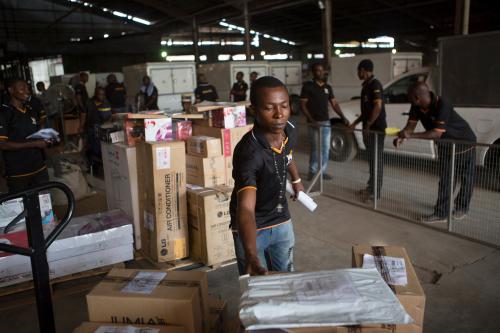In Chapter 3 of Foresight Africa 2024, our authors focus on policies to support Africa’s entrepreneurs and small businesses.
Essay
Making entrepreneurship work for Africa’s youth
By Ada Osakwe, Founder and Managing Partner, Agrolay Ventures and the Nuli Juice Company
By 2030, over 40% of the global youth population will be African and by 2050, the number of African youths is expected to reach 830 million. This growth trend is exciting, given the potential for young people in the workforce to unleash a demographic dividend that positively transforms millions of lives.
Unfortunately, Africa’s youth bulge may not drive the economic growth and wealth creation that is expected because more than 1 in 4 young people in Africa’s economies are not in employment, education, or training (NEET).1 The African Development Bank estimates that each year, up to 12 million youths in Africa enter a workforce that has only 3.1 million jobs available and consequently, 1.7 million new jobs need to be created each month to meet employment needs.
Entrepreneurship for job creation
The lack of productive, formal employment is increasingly pushing Africa’s youth to start their own businesses as entrepreneurs. Africa boasts the world’s highest rates of entrepreneurship, with more than 1 in 5 working-age Africans starting a new business and more than three-quarters of the youth planning to start one within five years.2
Africa boasts the world’s highest rates of entrepreneurship, with more than 1 in 5 working-age Africans starting a new business and more than three-quarters of the youth planning to start one within five years.
The challenge is that this entrepreneurship is mainly self-employment in the informal sector, what the International Labour Organization classifies as “vulnerable employment.” Ninety-five percent of Africa’s working youth fall into this category,3 compared to less than 50% in the Americas, Europe, and Asia. Vulnerable employment is reflected in low productivity, low earnings, and difficult working conditions.
Whether in the informal or formal sector, entrepreneurship in Africa is often plagued with problems including but not limited to:
- Lack of access to appropriate funding instruments required to start, maintain, and grow a business.
- High cost of operations due to inadequate infrastructure.
- Poor macroeconomic conditions.
- Government policies unsupportive to business.
Coupling these issues with low levels of economic growth and poor social protection schemes, African economies are expected to experience even more youth employment challenges in the future.
As an entrepreneur, I have directly experienced most of these hurdles. In 2016, I launched Nuli Foods, a medium-sized agribusiness that manufactures nutritious beverages with locally grown fruits and vegetables. Nuli has contributed to Nigeria’s economic landscape by creating jobs for youth, reducing post-harvest losses, creating steady incomes for smallholder farmers, and giving Nigerians access to better nutrition. However, building this business has come with significant challenges, including difficulties securing financing from banks and public institutions, high operating costs, crippling inflation rates, and instability in government policies.
Despite the myriad challenges facing anyone trying to build a business in Africa, African youth continue to have a strong entrepreneurial spirit, leading to entrepreneurship being considered as the solution to Africa’s job malaise. This is partly fueled by the increasing influence of digital technologies that provide new opportunities for innovation across sectors. Consequently, over the last decade, billions of dollars have been committed to developing Africa’s entrepreneurs. However, most public and donor-funded youth projects are failing to adequately provide the systemic support Africa’s young entrepreneurs need. For example, a recent Voxdev report states that approximately USD $1 billion is spent yearly on entrepreneurship training in developing countries.4 The report also notes that the returns from these investments are not yielding economic and social impacts.
Rethinking entrepreneur-led job creation in Africa
We must begin to reconsider the models of entrepreneurship support that exist in Africa to ensure that young people are not being blinded by a false narrative of future wealth and stability. Academic institutions, governments, donors, and capital providers should be more intentional about promoting a more enabling environment for entrepreneurship to thrive with the intention of creating jobs on a massive scale in Africa.
To achieve this, an approach to consider is providing focused support to “SME Eagles.”
Micro, small, and medium enterprises (SMEs) account for 80% to 90% of jobs on the continent, making them significant contributors to socio-economic development. Among these are enterprises that have demonstrated remarkable resilience because they have perfected their business models, created strong operational structures, grown revenues, and expanded their businesses, despite being faced with the Africa-specific challenges outlined above. These businesses can be referred to as SME Eagles.
Micro, small, and medium enterprises (SMEs) account for 80% to 90% of jobs on the continent, making them significant contributors to socio-economic development.
SME Eagles have the capacity to provide stable, wage employment for millions of young people, serving as anchors that create and sustain jobs. An example is a 150-tons-per-day milk processing factory in northern Nigeria, owned by a 30-year-old entrepreneur. To meet the needs of the factory, this entrepreneur developed an effective “outgrower” model with milk collection centers where rural pastoralists, the majority of whom are youths and women, deposit their milk daily in return for an income. Today, 18,000 farmers are part of this SME Eagle’s network, after only one year of operation. That’s 18,000 new, stable jobs, with the potential for thousands more as the factory expands production.
Wage employment also emerges when new firms are created. Because SME Eagles are tried, tested, and led by experienced entrepreneurs in a proven market, replicating their businesses de-risks failure for new entrepreneurs. Socially innovative franchising programs that match youth with these businesses, particularly in sectors that have the highest potential for impact, can be explored. They get the benefit of leap-frogging the trial and error stages of entrepreneurship, because SME Eagles will share their processes and business models with them, as well as the comfort of establishing an already proven business that has existing market demand. Furthermore, these youths will also get essential leadership training, mentorship, and business structure support.
Catalyzing entrepreneur-led job creation with SME Eagles will require providing affordable capital through blended finance mechanisms. For example, grants and other concessional funds, credit guarantees, interest rebates, and other tailor-made financing solutions could be made available for the acquisition of the franchise operations of an SME Eagle, or the establishment of SME Eagle entrepreneurial linkage programs.
Ultimately, for entrepreneurship to live up to its expectations for job-creation, SME Eagles must be enabled to thrive. Focusing government, donor, and private sector financial and policy support on SME Eagles mitigates the high risk of entrepreneurship failures. By providing the supporting business policies and institutional support, effective government regulations and incentives, workforce training subsidies, and affordable financing to these already de-risked, high impact, high productivity local SMEs, a more resilient form of entrepreneurship will emerge, driving stable job creation and inclusive economic growth for Africa’s youth.
Viewpoints








More from Foresight Africa 2024

In Chapter 1, our authors share policy options to address economic challenges facing Africa.

In Chapter 2, our authors tackle the existential climate change crisis.

In Chapter 4, our authors examine trends in regional economic integration and trade.

In Chapter 5, our authors consider policy options to unlock the potential of the digital economy.

In Chapter 6, our authors explore the ways Africa’s women and girls are increasing opportunity for all.

In Chapter 7, our authors delve into ways African leaders can regain the trust of their citizens.
-
Footnotes
- ILOSTAT. 2023. African youth face pressing challenges in the transition from school to work.
- Ichikowitz Family Foundation. 2022. Africa Youth Survey.
- ILO. 2018. Women and Men in the Informal Economy: A Statistical Picture, 3rd Edition. International Labour Organization.
- Voxdev Literature. September 2023. Training Entrepreneurs Issue 3.
The Brookings Institution is committed to quality, independence, and impact.
We are supported by a diverse array of funders. In line with our values and policies, each Brookings publication represents the sole views of its author(s).







